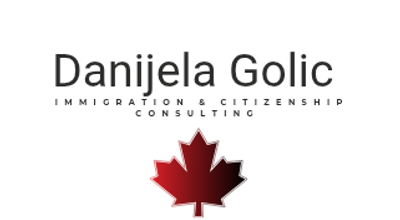


Welcome!
Hi, I am the owner of Danijela Golic Immigration and Citizenship Consulting, based in the beautiful province of British Columbia, Canada. As an immigrant myself, I understand the hopes, challenges, and dreams that come with starting a new life in a different country.
This personal experience, combined with my legal background and professional training, allows me to support my clients with both empathy and expertise.
License and Affiliations
I am a Regulated Canadian Immigration Consultant (RCIC), a licensed member of the College of Immigration and Citizenship Consultants (CICC), and a member of the Canadian Association of Professional Immigration Consultants (CAPIC). With a strategic and detail-oriented approach grounded in a genuine commitment to your success, my goal is to make your immigration journey as smooth and successful as possible.
Addressing Your Immigration Needs
I’m here to guide you every step of the way—with professionalism, integrity, and personalized care. Let’s take the next step in building your future in Canada, together.
Explore the Right Pathway for You
Canada offers numerous immigration programs, each with its own set of requirements, timelines, and opportunities. Whether you're looking to study, work, reunite with a loved one, or build a business, the right program for you depends on your unique background, goals, and eligibility.
Navigating the complex landscape independently can feel overwhelming. That's why professional guidance can make all the difference.
We take the time to understand your situation and help you explore the most suitable options.
Not sure where to start?
Let's talk.
Book your 20-minute exploratory session free of charge to learn how we can help you achieve your goals.

OUR SERVICES
Temporary Residence
Temporary residence in Canada allows individuals to visit, study, or work in the country for a specified period. Whether the goal is to explore Canadian culture, gain international education, or build career experience, there are different programs designed to meet each purpose. Each type of temporary status has its eligibility criteria, required documents, and permitted length of stay. Understanding these distinctions is key to choosing the right path and ensuring a smooth application process.

Temporary Resident Visa
A Canadian visitor visa, officially known as a Temporary Resident Visa (TRV), allows individuals from visa-required countries to enter Canada for a temporary stay. Whether you're visiting family and friends, exploring Canada as a tourist, or attending a business meeting or special event, the visitor visa is designed for short-term stays, typically up to six months. To be approved, applicants must show they have strong ties to their home country, sufficient financial means to support themselves during their visit, and a clear intention to leave Canada at the end of their authorized stay. In some cases, additional documentation such as invitation letters, travel itineraries, or proof of employment may be required. Depending on your nationality, you may instead need an Electronic Travel Authorization (eTA) to fly to Canada
.

Parent and Grandparent Supervisa
The Parents and Grandparents Super Visa is a special long‑term multiple-entry visa designed specifically for the parents and grandparents of Canadian citizens or permanent residents. It allows holders to stay in Canada for up to five years per visit, and is valid for up to ten years total, giving extended flexibility and family time without having to renew frequently.
To qualify, the host (your child or grandchild in Canada) must meet minimum income thresholds and provide a signed invitation letter promising financial support throughout the visit.
The applicant must also complete a medical examination, demonstrate admissibility, and purchase private health insurance (with at least $100,000 coverage for healthcare, hospitalization, and repatriation) valid for one year from entry.

Study Permit
A Study Permit is required for most international students studying in Canada at all levels, except those enrolled in programs lasting six months or less. Work authorization is available only for eligible post-secondary students.
You must be accepted by a recognized Designated Learning Institution (DLI) in Canada, show the prescribed amount of funds to cover living expenses and tuition fees, and meet all legal and program requirements.
If you wish to gain a valuable Canadian work experience, you may apply for Post-Graduation Work Permit which length depends on your study program length.

Work Permit
A Canadian work permit allows foreign nationals to legally work in Canada for a specific period, contributing to the economy while gaining valuable international experience. There are two main types of work permits: Labour Market Impact Assessment (LMIA)-based and LMIA-exempt. An LMIA is a document that an employer in Canada may need to obtain before hiring a foreign worker, showing that there is a need for a foreign worker and no Canadian citizen or permanent resident is available to do the job. In contrast, LMIA-exempt work permits are issued under special categories such as international agreements (e.g., CUSMA), intra-company transfers, or for humanitarian reasons. Work permits can also be employer-specific, meaning the foreign national is authorized to work only for the employer listed on the permit, or open work permits, which allow more flexibility by letting the holder work for almost any employer in Canada. The type of permit issued depends on the program under which the applicant is applying and their circumstances.
Permanent Residence
ECONOMIC IMMIGRATION
Canadian economic immigration programs are designed to attract skilled workers, entrepreneurs, and individuals with the experience and potential to contribute to Canada’s economy. These programs help address labour shortages, support economic growth, and build a strong workforce across provinces and territories. Key pathways include the Express Entry system, which manages applications for the Federal Skilled Worker Program, Federal Skilled Trades Program, and Canadian Experience Class, as well as Provincial Nominee Programs (PNPs) that allow provinces to select candidates based on regional labour market needs. Other economic pathways include programs for self-employed individuals, startup founders, and caregivers. Each stream has its eligibility requirements based on factors such as age, education, language skills, and work experience, and is tailored to support Canada’s long-term economic goals.

Federal Skilled Worker Program (FSWP)
The Federal Skilled Worker Program (FSWP) is one of Canada’s key economic immigration pathways under the Express Entry system, with the aim of attracting experienced professionals from around the world. It is designed for individuals with foreign work experience who possess the skills needed to contribute to Canada’s labour market. To qualify, applicants are assessed on a points-based system that considers factors such as age, education, language proficiency in English or French, skilled work experience, and adaptability. A minimum of one year of continuous full-time (or equivalent part-time) skilled work experience in an eligible occupation within the last 10 years is required. Successful applicants receive a Comprehensive Ranking System (CRS) score and may be invited to apply for permanent residence through periodic draws. The FSWP is a popular option for professionals seeking a straightforward path to living and working permanently in Canada.

Federal Skilled Trades Program (FSTP)
The Federal Skilled Trades Program (FSTP) is an economic immigration stream under Canada’s Express Entry system, designed specifically for skilled tradespeople who want to become permanent residents. This program targets individuals with specialized knowledge and hands-on work experience in sectors such as: construction, transportation, manufacturing and industrial, natural resources and agriculture. To qualify, applicants must have at least two years of full-time work experience in a skilled trade within the past five years, meet basic language requirements in English or French, and hold either a valid job offer from a Canadian employer or a certificate of qualification issued by a Canadian provincial or territorial authority. The FSTP helps meet labour shortages in Canada’s trades sectors and offers a direct pathway to permanent residence for qualified trades professionals.


Canadian Experience Class (CEC)
The Canadian Experience Class (CEC) is one of the three federal immigration programs managed under the Express Entry system and is designed for individuals who have gained skilled work experience in Canada. This program provides a streamlined pathway to permanent residence for temporary foreign workers and international graduates who have integrated into the Canadian labour market. To qualify, applicants must have at least one year of full-time (or equivalent part-time) skilled work experience in Canada within the last three years, meet the minimum language requirements in English or French, and plan to live outside the province of Quebec. The CEC does not require a Labour Market Impact Assessment (LMIA), and applicants do not need to show settlement funds, making it a popular and efficient route to permanent residency for those already established in Canada.

Provincial Nominee Programs (PNPs)
Provincial Nominee Programs (PNPs) are a vital part of Canada’s immigration system, giving provinces and territories the authority to nominate individuals who wish to settle in their region and contribute to the local economy. While the federal government manages overall immigration, PNPs allow each province (except Quebec and Nunavut) to tailor their immigration criteria to address specific demographic and labour market needs. Most PNPs include a variety of “base” streams and “enhanced” streams.
Base PNP streams operate independently from the Express Entry system. Applicants apply directly to the province and, if nominated, must then submit a separate application for permanent residence to the federal government. These streams are ideal for those who may not qualify under Express Entry but have strong ties to a particular province, such as a job offer, work experience, or education in that region.
Enhanced PNP streams, on the other hand, are linked to the federal Express Entry system. Candidates who receive a nomination through an enhanced stream are awarded 600 additional Comprehensive Ranking System (CRS) points, virtually guaranteeing an invitation to apply for permanent residence in the next Express Entry draw.
Common categories under basic PNPs include streams for skilled workers, international graduates, and semi-skilled or entry-level workers. Some provinces also offer streams for business immigrants or those with community or family connections. Each province sets its own eligibility criteria, selection process, and application procedures, so it’s important for applicants to choose a stream that matches their qualifications and long-term settlement goals.
NON-ECONOMIC IMMIGRATION
FAMILY SPONSORSHIP

Family Class
The Family Class sponsorship stream allows Canadian citizens and permanent residents to sponsor their spouse, common-law partner, or conjugal partner who is living outside Canada. This pathway is ideal for couples separated by distance, aiming to reunite families as quickly as possible. The sponsored partner must undergo medical and background checks, and both parties must prove that their relationship is genuine and not entered into for immigration purposes. Once permanent residence is granted, the partner can live, work, and study in Canada with no restrictions. The sponsor must commit to financially supporting the partner for three years from the date they become a permanent resident.
Spouse or Common-Law Partner in Canada Class
The Spouse or Common-Law Partner in Canada Class is designed for individuals who are already in Canada and wish to sponsor their spouse or partner without requiring them to leave the country. This class is suitable for those who are living together and can provide proof of their shared life. One unique benefit of this stream is that the sponsored person may be eligible for an open work permit while the application is being processed, allowing them to support themselves financially and contribute to the household. The relationship must be legitimate and meet the definition of a spouse or common-law partner, and both individuals must reside at the same address at the time of application. The sponsor must also agree to provide financial support for three years, even if the relationship ends during that period.

Dependent Child Sponsorship
Canadian citizens and permanent residents can sponsor their dependent biological or adopted children to become permanent residents of Canada. To be considered a dependent, the child must be under the age of 22 and not married or in a common-law relationship. In certain circumstances, children over 22 who have a physical or mental condition that makes them dependent on their parents may also be eligible. Adopted children must go through the international or Canadian adoption process, and the sponsor must show they are legally recognized as the child’s parent. The sponsor is responsible for the child’s financial needs and must commit to a 10-year undertaking or until the child turns 25, whichever comes first. This sponsorship stream allows families to reunite and ensure children have access to the opportunities and security Canada offers.

Parent and Grandparent Sponsorship
The Parents and Grandparents Program (PGP) allows Canadian citizens and permanent residents to sponsor their parents or grandparents for permanent residence. Due to high demand, the program operates on a lottery-based invitation system, where interested sponsors must submit an online interest form during the annual intake period. If invited to apply, sponsors must meet the Minimum Necessary Income (MNI) requirements for the past three consecutive tax years, and commit to financially supporting their parents or grandparents for 20 years (or 10 years if residing in Quebec). Sponsored individuals receive permanent residence and access to healthcare and other social benefits. Those not selected may consider applying for a Super Visa, which allows extended stays of up to five years at a time without needing permanent status.
Sponsoring Other Relatives
In exceptional cases, Canadian citizens and permanent residents may be eligible to sponsor other relatives, such as a brother, sister, nephew, niece, or grandchild, but only if they are orphaned, under the age of 18, and not married or in a common-law relationship. Additionally, a person may sponsor one extended family member of any age if they have no other living relatives who could be sponsored and no immediate family in Canada. This provision is rarely used but can be a lifeline for individuals who are truly alone and wish to bring a loved one to Canada. All sponsors must meet specific eligibility criteria, agree to financially support the relative, and ensure they will not rely on social assistance once in Canada.
CITIZENSHIP APPLICATION

Becoming a Canadian citizen is the final step in your journey to fully integrate in Canadian society. To be eligible, applicants must have been physically present in Canada for at least 1,095 days (3 years) out of the last 5 years, demonstrate adequate knowledge of English or French, pass a citizenship test on Canadian history, values, institutions, and symbols (if between ages 18 and 54), and meet their income tax filing obligations. Applicants must also hold valid permanent resident status and must not be under a removal order or have certain criminal prohibitions. Once approved, new citizens are invited to take the Oath of Citizenship, officially becoming full members of the Canadian community with the right to vote, apply for a Canadian passport, and enjoy all the privileges and responsibilities of citizenship.
Kindly Note:
To serve you better and provide the attention your case deserves, all consultations are held virtually. This allows us to review your documents carefully, provide clear guidance, and ensure nothing is overlooked. While you're welcome to call us to book your appointment, all follow-up communication, including sharing documents and receiving updates, will take place via email so we can keep everything organized and efficient. We do not offer consultations over the phone, as it's important for us to have a full picture of your situation, which isn't possible without reviewing your documents. If you prefer to meet in person, we're happy to arrange it upon request. Please note that an additional fee applies for in-person meetings.
The information provided on this website is for general informational purposes only and does not constitute legal advice. While we strive to ensure that the content is accurate and up to date, Canadian immigration laws and policies are subject to frequent changes. You should not act or refrain from acting based on any information found on this site without first seeking professional advice tailored to your circumstances.
Use of this website or communication through this site does not establish a consultant-client relationship. A formal relationship is only established once a written service agreement has been signed and the required fees have been paid.
We assume no responsibility or liability for any errors or omissions in the content of this website or for any losses that may result from reliance on the information provided herein.
For personalized guidance and support with your Canadian immigration matters, we encourage you to book a professional consultation.
